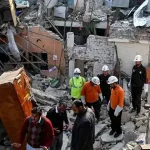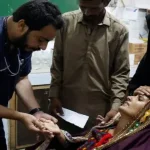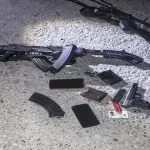BIBAK TOP: With the completion of the final phase of the operation Zarb-i-Azb in Shawal, the army has shifted its focus to the repatriation of internally displaced persons (IDPs), which will be initiated very soon in order to end by December, said senior military officers.
Eighty per cent of the displaced population will be back in their homes in North and South Waziristan by September, said an officer while briefing the media on Friday.
Also, the army has focused on development of infrastructure, provision of basic facilities as well as employment in the areas.
Briefing media persons at Bibak Top adjacent to the Afghan border in the remote Shawal Valley, Brigade Commander Brig Shabir Nariju said areas up to zero-line had been fully secured and at least 312-square-kilometre area was cleared.
Bibak Top at 9,400 feet is the central point of Shawal, dominating the entire valley. Security forces had launched an operation in February 2016 and killed 100 to 120 suspected terrorists while the army lost six personnel and 26 others wounded.
He said that one key leader of militants had surrendered to the security forces in Shawal, but declined to disclose his name. He added that Taliban leaders Sajna and Shaheryar had sanctuaries in Shawal.
Militants had developed an elaborate tunnel system housing their command and communication centres in Daber Miami, where security forces had set up their base camp, he explained.
Media was shown the underground facility which is 300 metres long and 15 to 35 feet deep, having washrooms and a hand pump. The centre had been established inside a residential compound. However, the military commanders expressed ignorance about the owner of the compound.
Brig Nariju said the facility was immune to any artillery or air strike and probably “high-value targets” lived there. “The army does not have ordnance to bust such a deep tunnel,” he said.
A US army Humvee was also recovered during the operation that belonged to Mullah Sungeen, a commander of the Haqqani network, who was killed in a US drone strike. The militants had abandoned this armoured vehicle which is still in running condition. Weapons and ammunition, including a piece of US-made Stinger missile, were also put on display at Daber Miami where security forces had combed all houses.
Brig Nariju said that individual infiltration from the Pakistan side was impossible because the security forces deployment was so heavy that they could visually communicate with each other and the border had been sealed.
“Any visitor can go to any part of the Shawal valley,” said Brig Nariju when a journalist asked him whether the area was safe for outsiders.
He said the return of the IDPs to Shawal would start very soon, while the army was also planning to start construction of basic facilities in the area. He said their priority was the construction of a highway that would pass through the valley. He said the estimated cost of the highway was Rs1.3 billion and it would be completed within two years.
Earlier, military officers during a briefing at Shakai-Tiarza in South Waziristan said work on 285 projects including basic health units, schools, roads and drinking water facilities was in progress in South Waziristan Agency, particularly in the Mehsud tribe area. The total cost of these projects was Rs3.85 billion.
In his briefing, Lt-Col Imran said that repatriation of all the IDPs would be completed by December, while 80 per cent of the displaced populations would be back in their homes by September.
“Now the army has population-centric approach,” he said. Elaborating, the officer said the army was focusing on development of infrastructure, provision of basic facilities as well as employment. Apart from constructing roads, schools, health facilities and completing water supply projects, the army was constructing shops which would be given to the local people on a nominal rent, he said. Besides, the officer said, 149 mosques had been reconstructed in the area.





